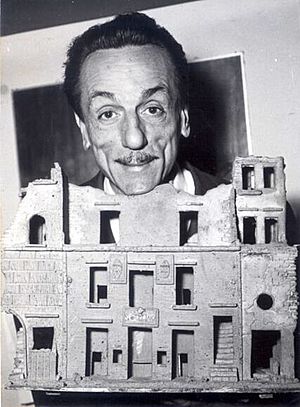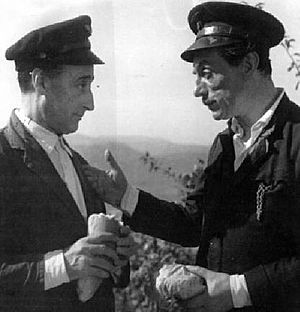Eduardo De Filippo facts for kids
Quick facts for kids
Eduardo De Filippo
|
|
|---|---|

De Filippo with a model of the
Teatro San Carlino (1955) |
|
| Born | 24 May 1900 |
| Died | 31 October 1984 (aged 84) Rome, Italy
|
| Occupation | Actor, director, playwright, screenwriter |
| Spouse(s) | Isabella Quarantotti (m. 1977) (d. 2005) Thea Prandi (1956–1959) (d. 1961) Dorothy Pennington (1928–1956) |
| Children | Luisa "Luisella" De Filippo (1950–1960) Luca De Filippo Angelica Ippolito (stepdaughter) |
| Parent(s) | Luisa De Filippo Eduardo Scarpetta |
| Relatives | Peppino De Filippo (brother) Titina De Filippo (sister) |
| Signature | |
 |
|
Eduardo De Filippo (born May 24, 1900 – died October 31, 1984) was a very important Italian artist. People often called him simply Eduardo. He was a talented actor, director, writer for plays, and movie writer.
Eduardo was especially famous for his works in the Neapolitan language, which is a dialect spoken in Naples. His most well-known plays are Filumena Marturano and Napoli Milionaria. Many people consider him one of the most important Italian artists of the 20th century. He wrote many plays that he also directed and acted in. These plays later became famous outside of Italy. Because of his amazing contributions to Italian culture, he was given a special title: senatore a vita. This means he became a senator for life, a very high honor in Italy.
Contents
His Life Story
Eduardo De Filippo was born in Naples, Italy. His parents were Eduardo Scarpetta, a famous playwright and actor, and Luisa De Filippo, who worked as a theater seamstress and costume maker. Eduardo was the middle child of three. His older sister was Annunziata, and his younger brother was Giuseppe. Both of his siblings also became well-known actors.
Eduardo started acting when he was only five years old! He loved the theater from a very young age. In 1932, he created his own theater company with his brother Peppino and sister Titina. They called it compagnia del Teatro Umoristico I De Filippo. This means "The De Filippo Humorous Theater Company."
After a few years, Peppino left the group in 1944. Titina also left in the early 1950s. After World War II, in 1948, Eduardo bought the S. Ferdinando theater in Naples. He officially opened it in 1954.
Eduardo also acted in movies. In 1954, he starred in a film called L'oro di Napoli (The Gold of Naples). He acted alongside famous stars like Totò and Sophia Loren. Later, in 1973, one of his plays from 1959, Sabato, domenica e lunedi (which means Saturday, Sunday, Monday), was performed in London. It was a big success and won an award from London's drama critics.
Eduardo was married three times. He had two children with his second wife, actress Thea Prandi: a daughter named Luisa, and a son named Luca. Sadly, his daughter Luisa passed away when she was only 10 years old. His son Luca followed in his father's footsteps and became an actor. Eduardo also had a stepdaughter named Angelica Ippolito.
Eduardo De Filippo passed away on October 31, 1984, in Rome. He was 84 years old. His son Luca continued his amazing work in the theater.
His Works
Eduardo De Filippo wrote many plays and acted in many films. Here are some of his most famous works.
Plays
- Farmacia di turno (The All-night Chemist, 1920)
- Uomo e galantuomo (Man and Gentleman, 1922)
- *Requie a l'anema soja/I morti non fanno paura (May his soul rest, 1926)
- Ditegli sempre di sì (Always tell him "yes", 1927)
- Filosoficamente (Philosophically, 1928)
- Sik-sik, l'artefice magico (Sik-sik the magical maker, 1929)
- Chi è cchiu' felice 'e me (Who's Happier than Me?, 1929)
- Quei figuri di trent'anni fa (Those Dudes of 30 Years Ago, 1929)
- Ogni anno punto e da capo (Every Year Back from the Start, 1931)
- È arrivato 'o trentuno (The 31st is Here, 1931)
- Natale in casa Cupiello (Christmas at the Cupiello's, 1931)
- La voce del padrone/Il successo del giorno (Success of the Day, 1932)
- Napoli milionaria (The Millions of Naples, 1945)
- Filumena Marturano (1946)
- Questi fantasmi (These Ghosts, 1946)
- Le voci di dentro (Inner Voices, 1948)
- La grande magia (The Great Magic, 1948)
- La paura numero uno (The Greatest Fear, 1950)
- Mia famiglia (Family of Mine, 1955)
- Bene mio e core mio (My Heart, my Treasure, 1955)
- De Pretore Vincenzo (Vincent De Pretore, 1957)
- Sabato, domenica e lunedì (Saturday, Sunday and Monday, 1959)
- Il sindaco del rione Sanità (Mayor of "Sanità" alley, 1961)
- L'arte della commedia' ("The Art of Comedy", 1964)
- Il monumento (The Monument 1970)
- Gli esami non finiscono mai (Exams never end, 1973)
Movies

- Three Lucky Fools (1933) – Gilberto, l'impresario
- The Three-Cornered Hat (1935) – Don Teofilo, il governatore
- Those Two (1935) – Il professore
- It Was I! (1937) – Giovannino Apicella
- Una Commedia fra i pazzi (1937)
- L'amor mio non muore! (1938) – Lorenzo, il finanziere
- The Marquis of Ruvolito (1939) – Il marchese di Ruvolito
- In the Country Fell a Star (1939) – Pasquale Montuori
- Il sogno di tutti (1940) – Il professore scienziato
- A che servono questi quattrini? (1942) – Il marchese Eduardo Parascandolo
- Non ti pago! (1942) – Don Ferdinando Quagliolo
- After Casanova's Fashion (1942) – Don Ferdinando
- Non mi muovo! (1943) – Don Carlo Mezzetti
- Il fidanzato di mia moglie (1943) – Gaspare Bellini
- Ti conosco, mascherina! (I know you, little Mask!, 1943) – Carmine
- Life Begins Anew (1945) – Il professore
- Uno tra la folla (1946) – Paolo Bianchi
- Assunta Spina (1948) – Michele Boccadifuoco
- Alarm Bells (1949) – Don Andrea
- Yvonne of the Night (1949) – L'avvocato Rubini
- Napoli milionaria (The Millions of Naples, 1950) – Gennaro Iovine
- Cameriera bella presenza offresi... (1951) – Raffaele, il professore di matematica
- Filumena Marturano (1951) – Domenico Soriano
- Three Girls from Rome (1952) – Vittorio
- Un Ladro in paradiso (1952)
- I sette peccati capitali ( Seven Deadly Sins, 1952) – Eduardo (segment "Avarice et la colère, L' / Avarice and Anger")
- Altri tempi (1952)
- Five Paupers in an Automobile (1952) – Eduardo Moschettone
- Ragazze da marito (Girls to be married, 1952) – Oreste Mazzillo
- Husband and Wife (1952) – Matteo Cuomo / Gennaro Imparato
- Napoletani a Milano (Neapolitans in Milan, 1953) – Salvatore Aianello
- Traviata '53 (1953) – Commendator Cesati
- It Happened in the Park (1953) – Donato Ventrella (segment: Il paraninfo)
- 100 Years of Love (1954) – Soldier Vincenzo Pagliaro (segment "Purificazione")
- Tempi nostri (1954) – Il conduttore
- Questi fantasmi (These Ghosts, 1954)
- The Gold of Naples (1954) – Don Ersilio Miccio (segment "Il professore")
- Cortile (1955) – Luigi
- La canzone del destino (1957)
- Fortunella (Happy-go-lucky Girl, 1958) – Head of the Theater Company
- L'amore più bello (1958) – Gennaro Esposito
- Raw Wind in Eden (1958) – Urbano Varno
- Ferdinando I, re di Napoli (1959) – Pulcinella
- Everybody Go Home (1960) – Signor Innocenzi
- Ghosts of Rome (1961) – Don Annibale, Principe di Roviano
- The Shortest Day (1963) – Mafioso
- Oggi, domani, dopodomani (Today, Tomorrow and the Day After, 1965) – Driver (segment "L'uomo dei 5 palloni")
- Spara più forte, più forte... non capisco (Shoot louder, I can't hear You, 1966) – Zi Nicola
- Ghosts – Italian Style (1966)
- The Canterbury Tales – voice of the old man in the Pardoner's Tale
See also
 In Spanish: Eduardo De Filippo para niños
In Spanish: Eduardo De Filippo para niños
 | Calvin Brent |
 | Walter T. Bailey |
 | Martha Cassell Thompson |
 | Alberta Jeannette Cassell |

